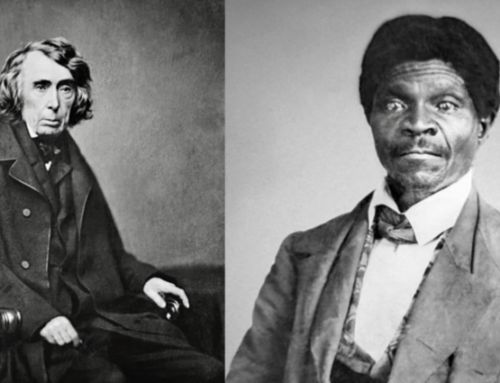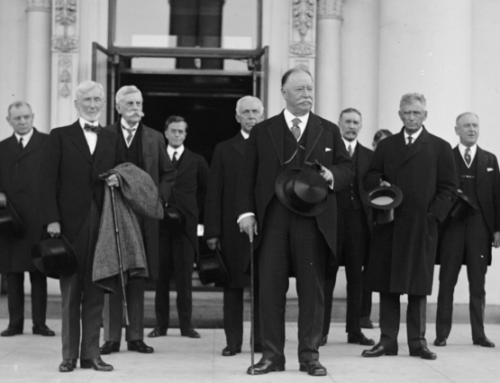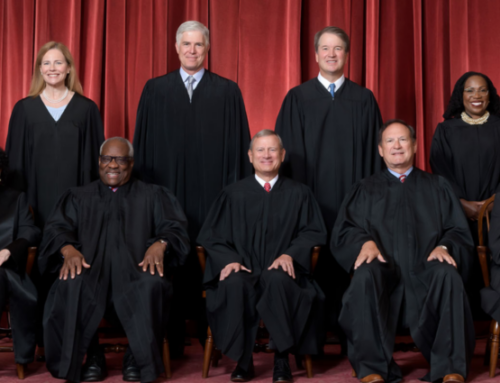In the case of United States v. Windsor, the Supreme Court found that the Constitution required formal, legal, and constitutional recognition of homosexual marriage. And yet if the Court had followed its own precedents, it would have ruled that Edith Windsor lacked the legal standing to file her original lawsuit…
 In Lawrence v. Texas (2003), the Supreme Court overturned its precedent seventeen years earlier in Bowers v. Hardwick (1986) in which the Court had upheld Texas sodomy law. Responding to Justice Antonin Scalia—who argued in dissent that by “principle and logic” the decision pointed to the next step of homosexual marriage—Justice Anthony Kennedy, writing for the Lawrence majority, said that the decision “does not involve public conduct or prostitution. It does not involve whether the government must give formal recognition to any relationship that homosexual persons seek to enter.”
In Lawrence v. Texas (2003), the Supreme Court overturned its precedent seventeen years earlier in Bowers v. Hardwick (1986) in which the Court had upheld Texas sodomy law. Responding to Justice Antonin Scalia—who argued in dissent that by “principle and logic” the decision pointed to the next step of homosexual marriage—Justice Anthony Kennedy, writing for the Lawrence majority, said that the decision “does not involve public conduct or prostitution. It does not involve whether the government must give formal recognition to any relationship that homosexual persons seek to enter.”
Ten years later in United States v. Windsor (2013), the subject of this essay, the Court overturned that part of the Lawrence precedent and did indeed find that the Constitution required formal, legal, and constitutional recognition of homosexual marriage.
The inevitable
Edith Windsor and her female spouse had been married in Canada in 2007, when even the state of New York did not have homosexual marriage. When the spouse died in 2009, she left her estate to Ms. Windsor, who because of the Defense of Marriage Act (DOMA) establishing natural marriage as the definition of marriage for purposes of federal law, had to pay substantial taxes on her inheritance. The IRS, citing DOMA, refused to recognize her as a “surviving spouse.”
DOMA, a defensive measure formally defining what the United States Congress said had always been “implicit” in federal law, was enacted in 1996 precisely in anticipation of the Supreme Court inevitably attempting to give “formal recognition” to homosexual marriage—that is, even before the Supreme Court in Lawrence in 2003 had said that it would not do so. In Romer v. Evans (1996), the Court had invalidated a new amendment to the Colorado state constitution approved by citizen referendum that forbade affirmative action for homosexuals. Passed four months after and in response to the Supreme Court’s Romer decision, DOMA provided that under all federal laws and regulations, marriage concerned “a legal union between one man and one woman.” It did not prevent states from enacting homosexual marriage in their own laws. DOMA passed the House by a vote of 342-67 and the Senate by a vote of 85-14.
The Court’s 2003 decision in Lawrence had strengthened the homosexual judicial cause established in Romer seven years earlier. Four months after Lawrence, the Massachusetts Supreme Court in Goodridge v. Dept. of Public Heath, had cited Lawrence as the principal basis for inserting homosexual marriage in that state’s constitution. However, the homosexual movement then stalled out; only five states enacted homosexual marriage by legislation. The obvious next step was the federal Constitution. Plaintiff Windsor alleged that DOMA was in violation of the judicially created element of the equal protection element of the Due Process Clause of the Fifth Amendment. Alleging that as a spouse she was exempt from estate taxes, she asked for a refund of the estate taxes that she had paid. The IRS, citing DOMA, refused to issue the refund.
The faithfulness of the President
As soon as the case was filed in federal district court in New York and before any ruling by that court, the Obama Justice Department filed a historically unprecedented notice with the district court that it would not defend the constitutionality of natural marriage as provided by DOMA. In that notice, DOJ said that “the President has concluded that… classifications based on sexual orientation should be subject to a heightened standard of scrutiny.” “The President,” DOJ said, had “instructed the Department [of Justice] not to defend the statute.” However, at the same time, the Department continued to enforce the IRS’s ruling against Ms. Windsor. Otherwise, there would have been no adversarial proceeding, no “case or controversy.” Neither Ms. Windsor nor the Department of Justice would have had any standing to be in court.
According to the Article II of the Constitution, the President must “take care” to see that federal laws are “faithfully executed.” At infrequent times in recent American history, the Department of Justice has notified the Court of its intention not to defend a statute because of an adverse lower-court ruling that had demonstrated irreconcilable contradictions in the statute’s wording or with other federal statutes.
Even rarer have been cases in which a lower federal court has found a federal statute to be unconstitutional, for in that situation, DOJ is in direct opposition to the Congress whose laws it was bound to faithfully defend, as well as to its own Executive who had signed the law (see the Chadha case below). But there was no precedent whatsoever for the Executive not defending so fundamental a statute—the Windsor Court said it applied to more than 1,000 federal laws—which the Congress had held to have been always “implicit” in the history and tradition of all federal laws, and before a ruling by a lower court against it. And Justice Kennedy, writing for the majority, recognized the difference because DOJ’s position, he said, had not been “preceded by an adverse judgment.” He said that President Obama’s decision not to defend the statute “reflected the Executive’s own conclusion.” As a substitute for the Executive and in order to ensure that DOMA was defended, the Court allowed the House of Representatives, by its Bipartisan Legal Advisory Group (BLAG), to file a brief as an intervenor.
When Attorney General Eric Holder notified the Court that it would not defend DOMA, he acknowledged the Department’s “longstanding practice of defending the constitutionality of duly-enacted statutes if reasonable arguments can be made in their defense.” Thus did the Obama Administration conclude that the only definition of marriage in world history could not reasonably be defended.
The only possible precedent for Windsor is the case of INS v. Chadha (1983), in which the Supreme Court ruled that the one-house legislative veto provision of the Immigration and Nationality Act was an unconstitutional violation of the separation of powers. Mr. Chadha was a Kenyan national residing in the United States on a temporary visa. With his visa expiring, Mr. Chadha successfully petitioned the Immigration and Nationalization Service (INS) to suspend deportation proceedings against him. When the House of Representatives voted to cancel the suspension and resume Mr. Chadha’s deportation, Mr. Chadha sued and argued that the one-veto was unconstitutional. Whereupon, the Reagan Administration’s Department of Justice agreed with Chadha about the constitutional issue but, as in Windsor, continued to enforce his deportation. Both the House and the Senate joined the suit in defense of the one-house veto.
In Windsor, Justice Kennedy said that Windsor and Chadha were “comparable” because in both cases the plaintiff was liable for personal injury: taxes or deportation. Indeed, Chadha is central to the majority opinion in Windsor. But, there are at least four differences. First, in Chadha, there were two genuine “cases or controversies” below: by the INS and by the House, that later triggered the larger constitutional issue. In contrast, Windsor was from the beginning an invented, activist attempt to overturn a comprehensive federal law. Second, both houses of Congress were parties in Chadha from the beginning, not mere permissive intervenors as in Windsor. Third, Chadha, unlike Windsor, involved an inevitable and direct constitutional dispute between the legislative and executive branches. Windsor was an agreement by the executive branch to support an attack on a federal law. Fourth, in his case, Mr. Chadha himself was individually and uniquely at risk by governmental action. Plaintiff Windsor, who had the same tax status as every other American taxpayer, chose on her own to create a case against herself.
Thus, the Obama Administration colluded with Ms. Windsor rather than opposing her by faithfully defending DOMA. And the Supreme Court colluded with the Obama Administration in allowing its Department of Justice to appear in court with the self-contradictory strategy of both opposing DOMA and supporting its enforcement against Ms. Windsor. Justice Kennedy called this only “a complication.”
A taxpayer’s suit
Ms. Windsor, a taxpayer, sued to have her estate taxes refunded. That was the basis of her standing to be in court. She had the opportunity to sue DOMA only because and on the basis of her standing to seek that tax refund.
Suits by plaintiffs identifying themselves as taxpayers have been almost impossible to pursue. Since the 1923 case of Frothingham v. Mellon, the Supreme Court has ruled that the paying of taxes does not give a taxpayer standing to challenge federal laws by alleging that his only injury is the paying of taxes. Frothingham had challenged a new federal program as an invasion of the sovereignty of the states under the Tenth Amendment. The Court ruled that did not have a direct, personal injury distinct from other taxpayers. The Court made an exception in Flast v. Cohen (1968), which concerned federal funds going to religious schools, but limited the exception to when a taxpayer is challenging the expenditure of federal funds under a Congressional spending measure, federal funds to religious schools. More recently, in Hein v. Freedom From Religion Foundation (2007), the Court called Flast v. Cohen a “narrow exception” and ruled that taxpayers did not have standing to challenge expenditures of the executive agency, the White House Office of Faith-Based and Community Initiatives.
Despite these precedents, Justice Kennedy for the Windsor majority pointedly identified Ms. Windsor’s case as a taxpayer’s suit. He said that she had “suffered a redressable injury” because she was “required to pay estate taxes from which, in her view, she was exempt” on account of the unconstitutionality of DOMA. Yet, the no-taxpayer-suits cases all concerned federal expenditures. Ms. Windsor’s suit actually concerned federal income. More importantly, her status as a taxpayer was simply a cover to allow her to attack DOMA—unlike Chadha’s case which had nothing to do with constitutionality when it began with proceedings in the INS. As in Frothingham and Hein, Ms. Windsor was subject to the same taxes as everyone else. The injury she alleged was the paying of taxes. In that regard, she had the same status as a general taxpayer and, thus, the same general purpose as the plaintiffs in all taxpayer suits.
On to marriage
The unprecedented paths discussed in this essay that led to a decision in Windsor on the merits of marriage, the separation of powers, and federalism were apparently all just “complications” to the Windsor majority. The Court decided to plough ahead:
Still, there is no suggestion here that it is appropriate for the Executive as a matter of course to challenge statutes in the judicial forum rather than making the case to Congress for their amendment or repeal. The integrity of the political process would be at risk if difficult constitutional issues were simply referred to the Court as a routine exercise. But this case is not routine. And the capable defense of the law by BLAG ensures that these prudential issues do not cloud the merits question, which is one of immediate importance to the Federal Government and to hundreds of thousands of persons. These circumstances support the Court’s decision to proceed to the merits.
Editor’s Note: This essay is part of a series on Supreme Court precedents established and then overturned or ignored in the fifty-year history of the right-of-privacy and homosexual-marriage cases.
The Imaginative Conservative applies the principle of appreciation to the discussion of culture and politics—we approach dialogue with magnanimity rather than with mere civility. Will you help us remain a refreshing oasis in the increasingly contentious arena of modern discourse? Please consider donating now.







Leave A Comment